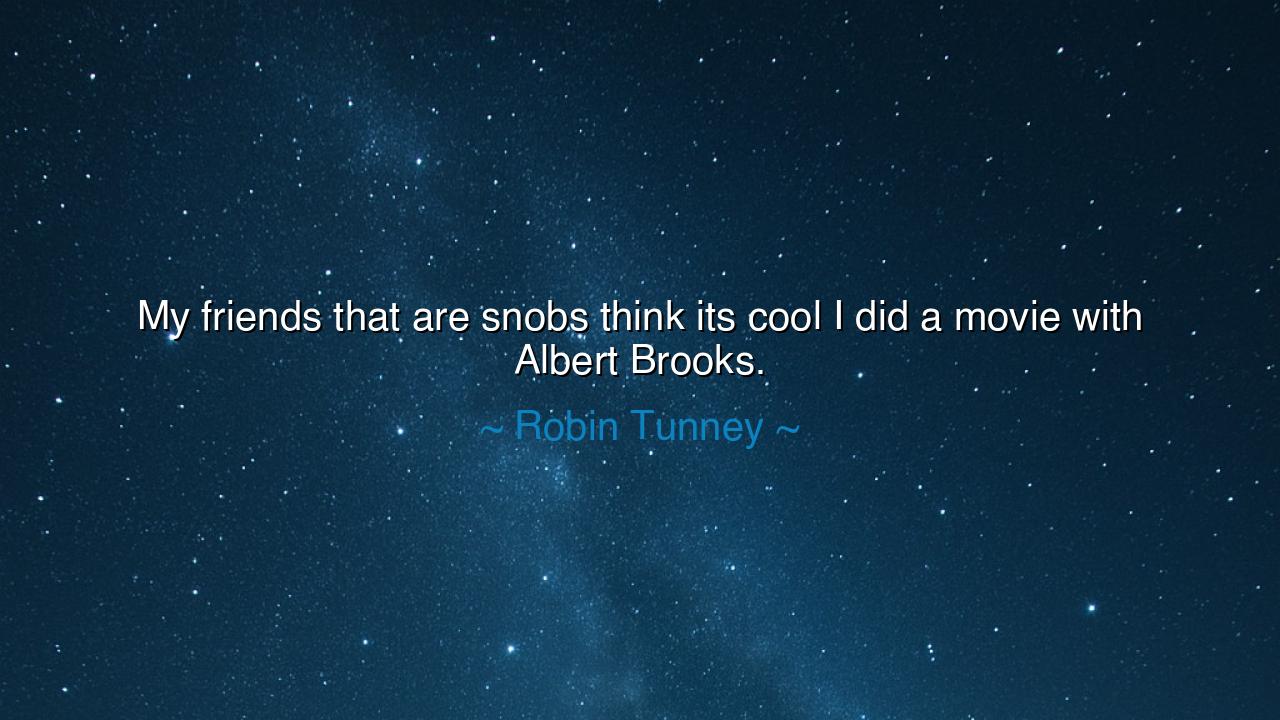
My friends that are snobs think its cool I did a movie with






In the course of human existence, there exists a tension between recognition and authenticity—between being admired for one’s choices and being true to oneself. Robin Tunney captures this dichotomy with the words, "My friends that are snobs think it’s cool I did a movie with Albert Brooks." In this statement, Tunney reflects on the complex nature of social validation and artistic choices, revealing that while some may place great value on certain collaborations or accomplishments, true satisfaction comes from aligning one’s work with personal integrity, not external approval. Tunney's acknowledgment of the snobbery around her decision is both a humorous critique and an invitation to reflect on the nature of authenticity in a world driven by superficial admiration.
The ancients were no strangers to the struggle between seeking recognition and remaining true to one’s self. In ancient Greece, the philosophers like Socrates and Plato often wrestled with the idea of virtue and integrity. Socrates, in particular, was mocked by many for his refusal to conform to societal norms or seek the favor of the powerful. He was not interested in appearing important or gaining the approval of the elite, but in finding truth and wisdom. This notion of staying true to oneself despite external pressures is deeply embedded in Tunney's words, which suggest that the value of an achievement is not always in how it is perceived by others, but in how it reflects the genuine spirit of the artist or individual.
Similarly, Rome, with its complex layers of societal and political structures, saw its own tension between public persona and authenticity. Cicero, the Roman statesman and philosopher, often critiqued the elite class for their obsession with appearances and status. He understood that true honor did not come from external recognition but from virtue and personal integrity. Like Tunney, Cicero acknowledged the weight that society placed on status, but he also emphasized that true greatness lies in the character of the individual. The ancient wisdom suggests that while recognition from the elite may be flattering, it should never define one’s worth or determine the value of one’s actions.
Tunney’s words also offer a glimpse into the modern world’s obsession with celebrity culture—where who you know, or who you’ve worked with, can sometimes outweigh the actual substance of your work. This mirrors the Renaissance period, a time when the patronage of wealthy families like the Medici was crucial to an artist’s success. Leonardo da Vinci, Michelangelo, and other masters of the Renaissance era often worked under the patronage of these powerful families. While their work was undeniably brilliant, the status of their patrons was an undeniable force that shaped their careers. In Tunney’s case, the work with Albert Brooks may not be important because it grants her the approval of the elite, but rather because it represents her own artistic choice, regardless of whether others view it as “cool.”
The lesson in Tunney’s words is a reminder to not allow the judgments or expectations of others to dictate one’s path. Socrates did not choose his path to gain favor with the powerful, nor did Michelangelo chisel his masterpieces to meet the demands of society's elites. Instead, both were driven by a desire for personal fulfillment and the pursuit of something greater—whether that be wisdom, beauty, or truth. The genuine artist chooses their work for the satisfaction it brings them, not for the applause of others. Tunney’s statement serves as an invitation for us all to reflect on whether we are making choices for authentic reasons or simply to gain the approval of those around us.
In practical terms, we can apply Tunney’s wisdom by ensuring that our decisions—whether in our careers, relationships, or creative endeavors—are made in alignment with our values and beliefs. It is easy to fall into the trap of seeking validation from those in power or from those who seem to possess greater social influence, but true satisfaction comes from making choices that reflect personal integrity. Whether it’s choosing a project, a partner, or a goal, we should prioritize our own sense of meaning over societal applause. In doing so, we not only preserve our own sense of self-worth, but we also contribute something genuine to the world, not just a reflection of what others want to see.
Thus, the lesson from Tunney’s words, in the tradition of the ancients, is clear: true value lies in the authenticity of the individual and their choices, not in the accolades of the powerful. Whether in the arts, philosophy, or everyday life, we must strive to make choices that reflect our deepest values, not the superficial approval of others. The genuine self, unshackled by the need for validation, is free to create, to lead, and to live a life filled with purpose. In this way, we can build a legacy that is not based on fame or prestige, but on integrity and authenticity—qualities that are timeless and unassailable.






AAdministratorAdministrator
Welcome, honored guests. Please leave a comment, we will respond soon